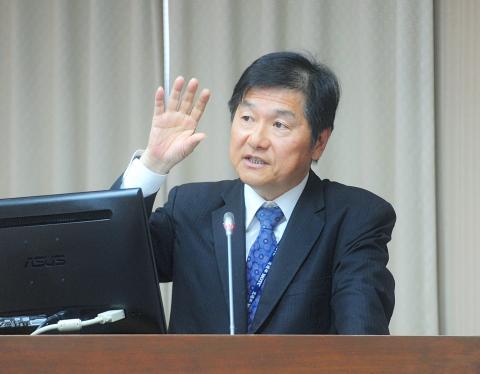Lawmakers yesterday urged the Tourism Bureau to step up its crackdown on operators of illegal daily room rentals, including those posted on the popular online platform Airbnb.
The legislature’s Transportation Committee yesterday reviewed amendments to the Act for the Development of Tourism (發展觀光條例) proposed by the bureau and lawmakers.
Democratic Progressive Party (DPP) legislators Lin Chun-hsien (林俊憲) and Chen Su-yueh (陳素月) focused their questions on the bureau’s proposed amendments to Article 55 to Article 55-1 of the act, which would impose harsher penalties on illegal hotel and bed and breakfast operators.

Photo: Wang Yi-sung, Taipei Times
These include a fine of up to NT$2 million (US$64,714) and repeated fines if the illegal act persists.
Operators of online platforms such as Airbnb or Booking.com would also face up to NT$2 million in fines for posting information about illegal accommodation and would be asked to remove the content.
Airbnb was founded on the concept of a sharing economy, where people put extra rooms in their houses up for rent, Lin said.
However, the New York and Florida state governments have launched a large-scale crackdown on illegal operators posting ads on the platform, as it has severely disrupted the rental housing market and affected the businesses of legal hotel and bed and breakfast operators, he said.
Airbnb has 35,000 daily room rentals on its list for Taiwan, including about 10,000 in Taipei, he said.
“The Web site shows that four people each have more than 50 rooms available to rent and six other people each have more than 40 rooms to rent. Do you know anyone who has 50 rooms to ‘share’ with other people? Is this how a ‘sharing economy’ works?” Lin asked.
“This shows that some group are abusing online platforms to run illegal hotel businesses,” he added.
The bureau should also ask Airbnb to establish a subsidiary in Taiwan, Lin said, adding that it should let the platform operator know the nation is ruled by law.
The government should crack down on illegal daily room rentals, or many young people would not be able to find affordable rooms to rent, he said.
Deputy Minister of Transportation and Communications Chi Wen-chung (祁文中) said that the proposed amendments are designed to raise the penalties against illegal operators and the bureau is collecting public opinions about the proposal.
“We have told platform operators that we hope the information posted on the platforms belongs to legal hoteliers and bed and breakfast operators,” Chi said. “This way consumers need not worry that they might end up with an illegal rental that is not regulated by the law.”

The Ministry of Economic Affairs has fined Taobao NT$1.2 million (US$36,912) for advertisements that exceed its approved business scope, requiring the Chinese e-commerce platform to make corrections in the first half of this year or its license may be revoked. Lawmakers have called for stricter enforcement of Chinese e-commerce platforms and measures to prevent China from laundering its goods through Taiwan in response to US President Donald Trump’s heavy tariffs on China. The Legislative Yuan’s Finance Committee met today to discuss policies to prevent China from dumping goods in Taiwan, inviting government agencies to report. Democratic Progressive Party Legislator Kuo Kuo-wen (郭國文) said

The Ministry of Economic Affairs has fined Taobao NT$1.2 million (US$36,900) for advertisements that exceeded its approved business scope and ordered the Chinese e-commerce platform to make corrections in the first half of this year or its license would be revoked. Lawmakers have called for stricter supervision of Chinese e-commerce platforms and more stringent measures to prevent China from laundering its goods through Taiwan as US President Donald Trump’s administration cracks down on origin laundering. The legislature’s Finance Committee yesterday met to discuss policies to prevent China from dumping goods in Taiwan, inviting government agencies to report on the matter. Democratic Progressive Party

Taiwan and its Pacific ally Tuvalu on Tuesday signed two accords aimed at facilitating bilateral cooperation on labor affairs, according to Taiwan’s Ministry of Foreign Affairs (MOFA). The governments inked two agreements in Taipei, witnessed by Foreign Minister Lin Chia-lung (林佳龍) and visiting Deputy Tuvaluan Prime Minister Panapasi Nelesone, MOFA said in a news release. According to MOFA, the agreements will facilitate cooperation on labor issues and allow the two sides to mutually recognize seafarers’ certificates and related training. Taiwan would also continue to collaborate with Tuvalu across various fields to promote economic prosperity as well as the well-being of their

Sung Chien-liang (宋建樑), who led efforts to recall Democratic Progressive Party (DPP) Legislator Lee Kun-cheng (李坤城), was released on bail of NT$80,000 today amid outcry over his decision to wear a Nazi armband to questioning the night before. Sung arrived at the New Taipei District Prosecutors’ Office for questioning in a recall petition forgery case last night wearing a red armband bearing a swastika, carrying a copy of Adolf Hitler’s Mein Kampf and giving a Nazi salute. Sung left the building at 1:15am without the armband and covering the book with his coat. Lee said today that this is a serious